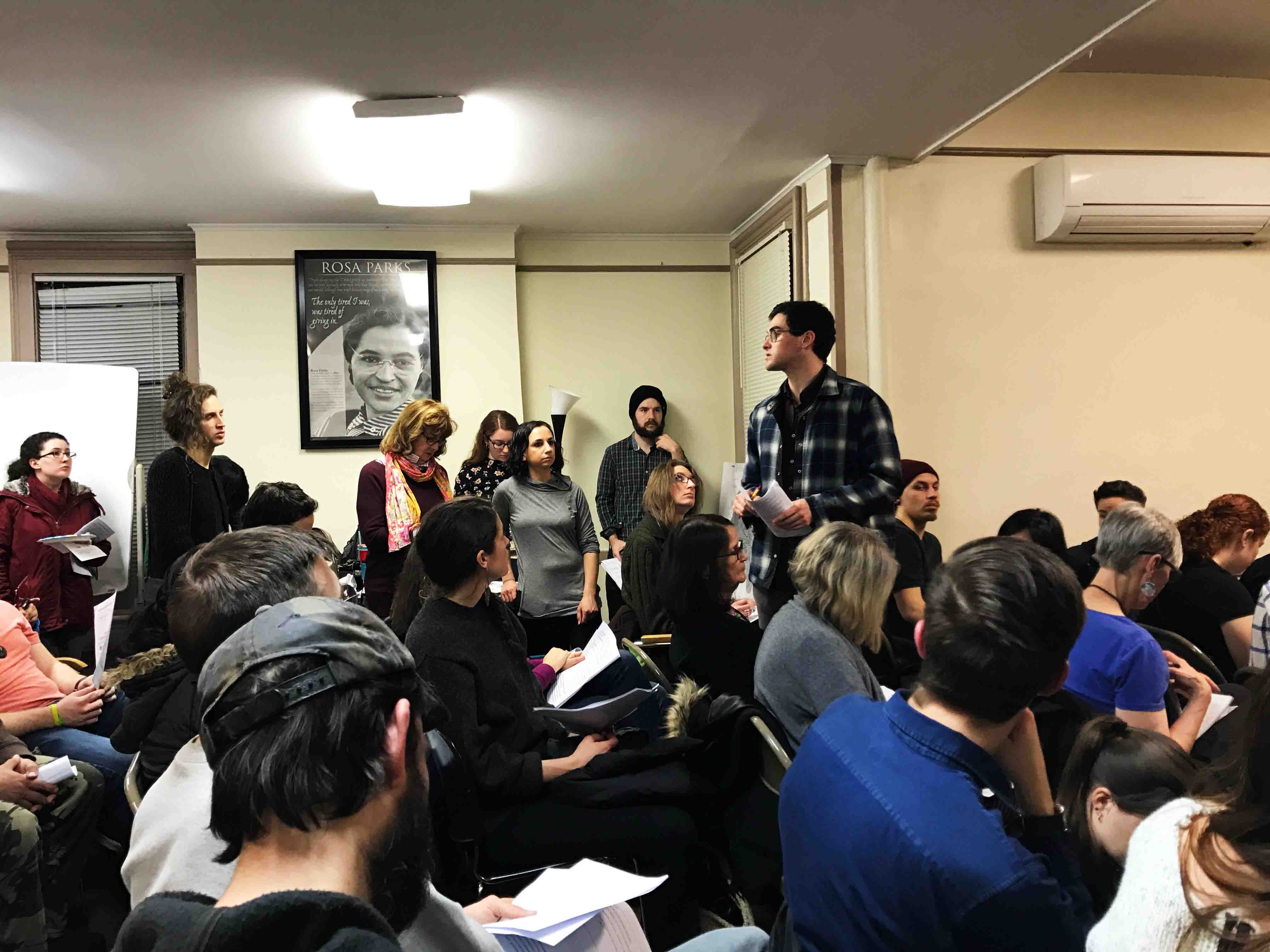
Chilly rain on Wednesday night did not deter roughly 100 people from filing into the New Haven People’s Center for an activism workshop, cohosted by local advocacy groups Unidad Latina en Acción and Showing Up for Racial Justice New Haven.
Running at full capacity, the People’s Center, located at 37 Howe St., hosted an information session and networking event called “Resisting Deportations: A Workshop for Allies.” Amid increasing reports of nationwide deportation raids conducted by U.S. Immigration and Customs Enforcement, people from across Connecticut gathered to learn the state’s history of immigrant rights and the possible means to engage in protecting these rights.
The event received a wide range of attendees, from experienced activists and volunteers to concerned citizens and undocumented residents, all of who were eager to learn how to incorporate themselves into resistance movements. Sign-up sheets, which ask attendees about their language skills and special interests in civil liberties, were circulated during the event for activist groups to create a database and to connect concerned residents from various towns in Connecticut.
Zach Kenney, a North Haven resident who was invited to the workshop by a friend, said he wanted to see how exactly he could pitch in despite his lack of previous involvement with organizations like ULA and SURJ.
An undocumented couple who wished to remain anonymous for safety concerns said they are nervous about their fate after hearing news about more frequent ICE raids. Though it was their first time attending events like this workshop, they were interested in learning how to protect their rights.
“We have three kids, and we have been here for 23 years. That’s why we are nervous,” the couple said. “We need information about [our] rights.”
ULA member Megan Fountain ’07, one of the three event organizers, opened Wednesday night’s discussion with a history of Connecticut and New Haven immigrant rights and activism efforts, which date back almost two decades.
Her speech touched on many activism efforts in the past, such as mass protests, civil disobedience demonstrations and legislative advocacy, that have directly contributed to protecting immigrants’ rights and releasing wrongfully imprisoned immigrants.
Fountain also said local initiatives like Elm City identification cards give undocumented workers access to many city services like public schools, public libraries and opening bank accounts. But two days after the Board of Alders voted to issue ID cards for all New Haven residents, ICE conducted a raid without court-issued warrants Fair Haven that resulted in almost 30 arrests, Fountain said. ICE’s retaliation was eventually ruled illegal in court and all arrestees were released after rounds of advocacy and bail fundraising efforts, she added.
Fountain said the city implemented a general order that separated the New Haven Police Department officers from ICE back in 2006, thus consolidating the department’s resources to public safety and community efforts.
Though New Haven’s standing as a sanctuary city means that the NHPD does not question residents about their immigration status, the outdated sanctuary city policies do not have a complete noncooperation policy between public schools and NHPD with ICE, Fountain said. She added that ULA, among other activist groups, is working with Yale Law School students to draft a new ordinance so that the alders can vote to address those loopholes.
As another event organizer and a member of SURJ, Anna Robinson-Sweet ’11 spoke about several concrete actions that residents can take to distribute more resources and information. For instance, volunteers can help ULA hand out pamphlets with information regarding immigrant rights to undocumented families.
Rapid response and direct action are among other crucial strategies to participate in activism efforts, Fountain said. ULA currently has a hotline that is staffed by fluent Spanish-speaking volunteers who receive tips about potential ICE raids and possible sightings of ICE agents in neighborhoods, she said. She also encouraged residents to take photos or videos because documenting evidence is helpful in fighting deportation cases in courts.
“ICE operations usually happen in the middle of night,” Fountain said. “But as soon as we find out, we want to shed light on the violence that ICE has committed on our communities.”
During the workshop, ULA member John Lugo stressed the importance of establishing rapid response systems as soon as possible because he received word that there were 11 federal border patrol agents at Union Station earlier in the afternoon, leading ULA members to arrive there with attorneys in a Yale Law School immigration clinic. But the agents were there only to conduct screenings for radioactive materials, according to the New Haven Independent.
Rapid response was a top priority in the discussion Wednesday night, said Christine Gauvreau, a New Britain resident and advocate for the Connecticut Coalition to Stop Indefinite Detention. She said she wished to be plugged into communities and groups like ULA and SURJ because she believes that deportation should be met with protest and massive show of solidarity.
Referring to undocumented immigrants as “the scapegoats for larger social problems,” Gauvreau said illegal arrest and deportations are assaults on civil liberties and destructive to all social movements.
A rally advocating for immigrant rights, organized by ULA and SURJ among others, is scheduled to take place in front of City Hall at 5 p.m.







